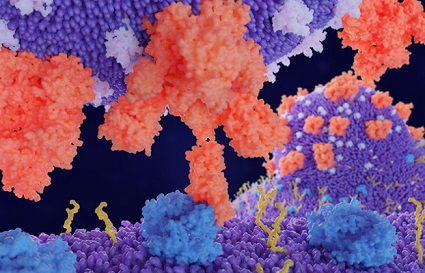Nikhil Prasad Fact checked by:Thailand Medical News Team Jun 07, 2024 10 months, 2 weeks, 5 days, 8 hours ago
COVID-19 News: The COVID-19 pandemic, driven by the novel coronavirus SARS-CoV-2, has disproportionately affected individuals with underlying health conditions such as diabetes and hypertension. Central to the virus's pathology is its interaction with the angiotensin-converting enzyme 2 (ACE2), which acts as a receptor for SARS-CoV-2. Recent research highlights how the SARS-CoV-2 spike protein influences the carboxypeptidase activity of ACE2, particularly in organs affected by diabetes and hypertension. The study covered in this
COVID-19 News report by researchers from Mexico, aims to explore these interactions, providing insights into the mechanisms that may exacerbate COVID-19 severity in these populations.
 SARS-CoV-2 Spike Protein Enhances Carboxypeptidase Activity of ACE2
Understanding Carboxypeptidase Activity of ACE2
SARS-CoV-2 Spike Protein Enhances Carboxypeptidase Activity of ACE2
Understanding Carboxypeptidase Activity of ACE2
ACE2 is not just a receptor for SARS-CoV-2; it also plays a crucial role in regulating blood pressure and inflammation through its carboxypeptidase activity. This enzyme cleaves a variety of peptides, including angiotensin II, apelin, and bradykinin, which are involved in cardiovascular and renal function. By converting angiotensin II to angiotensin-(1-7), ACE2 exerts protective effects against hypertension and inflammation. However, the interaction between the SARS-CoV-2 spike protein and ACE2's carboxypeptidase activity could disrupt these protective pathways.
Methodology
In this study, researchers used two experimental rat models to represent diabetes and hypertension. They measured ACE2 activity, specifically its carboxypeptidase function, in the plasma, heart, kidneys, liver, lungs, and six brain regions (amygdala, brain stem, cortex, hippocampus, hypothalamus, and striatum) of these rats. The influence of the SARS-CoV-2 spike protein on ACE2 activity was also examined.
Results - Blood Glucose and Blood Pressure
The diabetic rats had significantly higher blood glucose levels (578 ± 24 mg/dL) compared to control rats (116 ± 2.5 mg/dL). Hypertensive rats showed elevated systolic blood pressure (196 ± 10 mm Hg) compared to controls (123 ± 5 mm Hg).
Carboxypeptidase Activity in Diabetic Rats
In diabetic rats, ACE2 carboxypeptidase activity varied across different organs:
-Liver: ACE2 activity significantly increased and was further enhanced by the spike protein.
-Lung: ACE2 activity remained unchanged compared to controls but increased with the spike protein.
-Kidney: ACE2 activity decreased with no additional change from the spike protein.
-Heart: No change in ACE2 activity was observed with or without the spike protein.
-Brain Regions: ACE2 activity increased in the brain stem and striatum, decr
eased in the amygdala, cortex, and hippocampus, and showed no change in the hypothalamus.
Carboxypeptidase Activity in Hypertensive Rats
In hypertensive rats, ACE2 carboxypeptidase activity showed distinct patterns:
-Heart: ACE2 activity decreased compared to controls but increased in the presence of the spike protein.
-Kidney, Liver, and Lung: ACE2 activity increased compared to controls with no change due to the spike protein.
-Brain Regions: ACE2 activity increased in the hypothalamus and striatum in the presence of the spike protein, while it decreased in the cortex and amygdala without further change from the spike protein.
ACE2 Protein Levels
The study also measured ACE2 protein levels using enzyme-linked immunosorbent assay (ELISA). Results showed that ACE2 protein levels did not always correlate with ACE2 activity. For example, in diabetic rats, ACE2 protein levels increased in the heart but decreased in the kidney, brain stem, cortex, hippocampus, hypothalamus, and striatum. In hypertensive rats, ACE2 protein levels decreased in the brain stem, cortex, hippocampus, and hypothalamus.
Discussion
The findings suggest that the SARS-CoV-2 spike protein can enhance the carboxypeptidase activity of ACE2 in specific organs, potentially contributing to the severity of COVID-19 in diabetic and hypertensive individuals. The study highlights the complexity of ACE2 regulation, noting that ACE2 activity does not always align with protein levels, indicating post-translational modifications and other regulatory mechanisms at play.
Future Directions
Further research is needed to explore the molecular mechanisms underlying the differential effects of the SARS-CoV-2 spike protein on ACE2 activity. Additionally, studies on human tissues and clinical trials could validate these findings and contribute to the development of effective treatments for COVID-19.
Conclusion
Understanding how the SARS-CoV-2 spike protein influences the carboxypeptidase activity of ACE2 in different organs can provide insights into the pathophysiology of COVID-19, particularly in vulnerable populations with comorbidities like diabetes and hypertension. This knowledge could inform the development of targeted therapies to mitigate severe outcomes in these groups.
The study findings were published in the peer reviewed International Journal of Molecular Sciences.
https://www.mdpi.com/1422-0067/25/11/6276
For the latest
COVID-19 News, keep on logging to Thailand Medical News.
Read Also:
https://www.thailandmedical.news/news/scientists-discover-that-combining-il-6-inhibitors-with-current-medications-is-a-better-approach-for-treating-pulmonary-hypertension
https://www.thailandmedical.news/news/japanese-pediatricians-warn-that-sars-cov-2-can-cause-pulmonary-hypertension-in-children
https://www.thailandmedical.news/news/breaking-covid-19-news-sars-cov-2-is-causing-new-onset-of-diabetes-mellitus-even-in-babies-a-few-months-old
